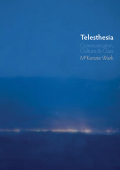
The telegraph, telephone, and television, not to mention the Internet and mobile telephony, are all forms of communication that move information faster than the speed at which objects move. Both labor and capital and armies and commodities once moved at the same speed as the information organizing them. Over the last two centuries, social space has developed a strange folded quality, where physical space comes more and more to be doubled by a space of the movement of information. Telesthesia, or perception at a distance, comes increasinglyto characterize how we see and hear and know the world.How does the evolutionof different communication forms affect how we can perceive and act? How can the underlying infrastructure of communication forms be detected in the eventsof everyday life? These are the central questions animating this book. McKenzie Wark first explores relations between metropolitan and peripheral cultures or postcolonial relations with close attention to the texture of events that can happen when perception is mediated. He then examines what were once called postmodern experiences, and how relations of communication create new kinds ofclass relations and experiences of everyday life, from 9/11 to Occupy Wall Street.
- ISBN: 978-0-7456-5399-0
- Editorial: Polity Press
- Encuadernacion: Rústica
- Páginas: 224
- Fecha Publicación: 27/07/2012
- Nº Volúmenes: 1
- Idioma: Inglés
